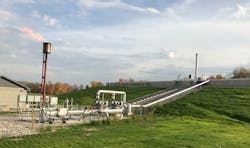Smart dairy processors know that wastewater does not need to be wasted. By investing in certain wastewater treatment technology, dairy processors can milk more out of the water used during everyday operations, transforming wastewater into a valuable resource in its own right. Rothenbühler Cheesemakers is one of these conscientious dairy processors.
The Problem
Since 1956, Rothenbühler Cheesemakers has been producing award-winning cheese using all-natural ingredients and 100% Grade A milk. Formerly known as Middlefield Cheese, the family-owned company is one of the largest Swiss cheese manufacturers in the United States. Its plant in Middlefield, Ohio, produces five Swiss cheese varieties, as well as many other hard and semi-hard cheeses, which allows them to also offer high-quality whey ingredient products.
Rothenbühler Cheesemakers prides itself on being a good steward to the earth, blending the cheese-making artistry of the past with modern day innovation. The company’s USDA-approved, Safe Quality Foods (SQF) Level III-certified facility was already using eco-friendly “green” initiatives to recycle onsite resources and responsibly treat its own wastewater. But the cheese processor wanted to go above and beyond basic environmental requirements by investing in an onsite solution to anaerobically pre-treat raw wastewater. It simply needed the right technology.
The Solution
ADI Systems was selected to design, install and commission an anaerobic wastewater treatment system for Rothenbühler Cheesemakers’ plant in Middlefield. The system consists of a 230,000-gal equalization tank, which pumps wastewater into an in-ground 6.8-million-gal ADI-BVF digester. Anaerobic effluent is discharged by gravity to the existing downstream membrane bioreactor (MBR) system for aerobic polishing. The project also included construction of a control/electrical equipment building.
“We are thrilled to be able to process our wastewater responsibly,” said Gary Schoenwald, chief automation officer, Rothenbühler Cheesemakers. “The ADI-BVF digester supports our vision of a well-ordered, efficient and technically advanced system.”
The low-rate system is designed to treat 600,000 gpd of wastewater and remove approximately 90% of the influent chemical oxygen demand (COD). The large volume of the BVF digester provides a robust and diverse anaerobic microorganism community, making the system resilient to variations in influent characteristics such as organic load, influent solids concentrations, pH, temperature and alkalinity. As wastewater passes upward through the sludge blanket, microorganisms digest the majority of the organic load, reducing COD, total suspended solids (TSS) and fats, oils and grease (FOG).
The Results
The wastewater treatment system that ADI Systems engineered for Rothenbühler Cheesemakers has simplified and improved process efficiency. The BVF digester can directly digest raw wastewater (no dissolved air flotation or other FOG or TSS removal is required) and requires very little electrical horsepower, helping lower operational costs. Aeration energy and chemical requirements for the existing aerobic system have also been reduced.
Anaerobic digestion of wastewater has many advantages, including energy recovery from biogas. The process naturally produces biogas, which is collected beneath the digester’s gastight cover, minimizing greenhouse gas emissions. The biogas can be treated and utilized as a source of heat or electricity. At design conditions, approximately 320,000 cu ft (9,000 cu m) of biogas is captured per day at Rothenbühler Cheesemakers’ production plant; it will be utilized in a new dual-fuel boiler, further minimizing costs for the cheese-maker. The digester’s long solids retention time and hydraulic retention time ensure complete biodegradation of the raw organic compounds, thus higher biogas production can be achieved.
“This project was a success due to the attention to detail that we experienced from ADI Systems’ staff – everything from the concept drawings through to installation and start-up,” Schoenwald said. “The wastewater treatment system reduces our electrical consumption, provides biogas to supplement our existing plant heating, reduces biosolids production and ultimately reduces our carbon footprint. We have seen significant savings in our electrical consumption and expect exceptional savings as well from the use of the biogas.”
Rothenbühler Cheesemakers, with the help of modern-day wastewater treatment technology, has set an example for the dairy industry and proved to the public that dairy products can be made sustainably and responsibly.
